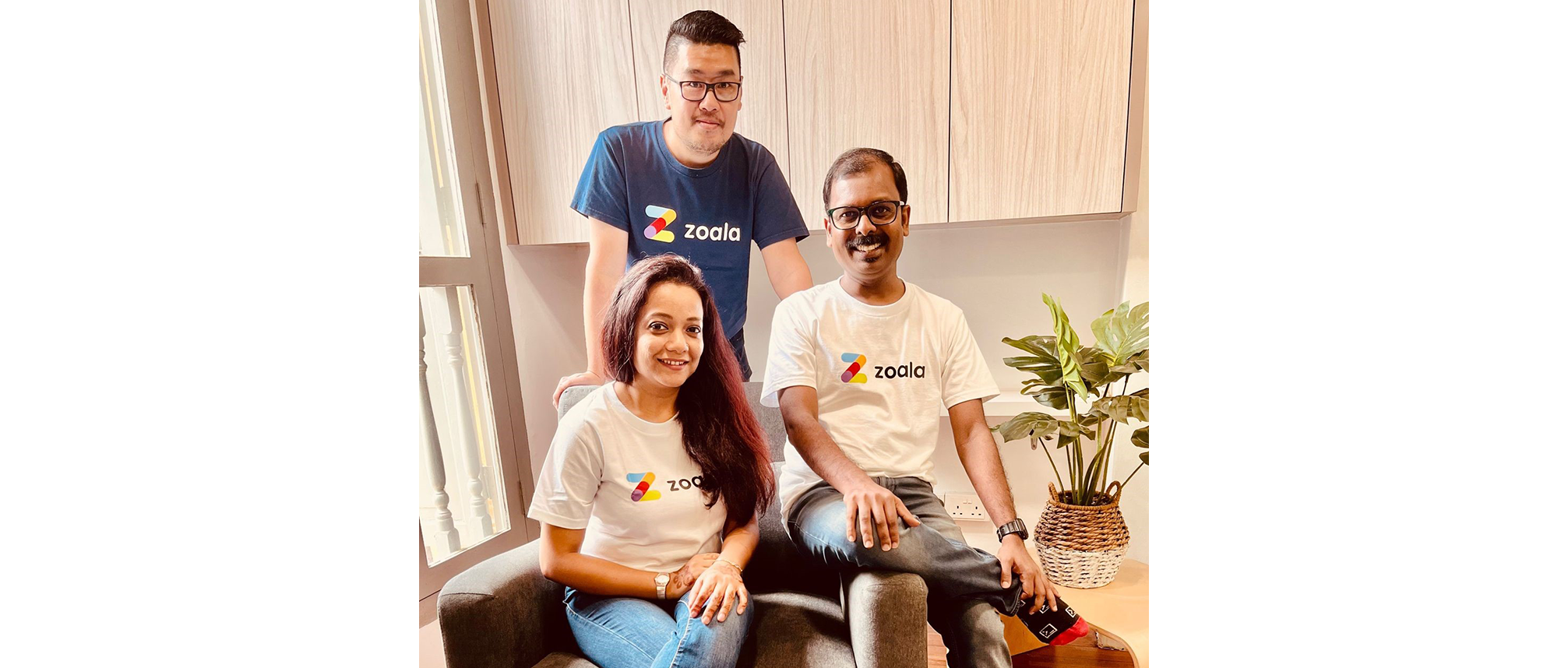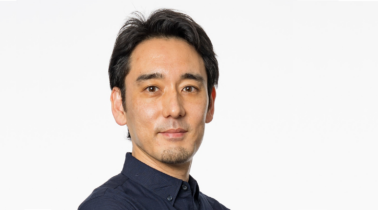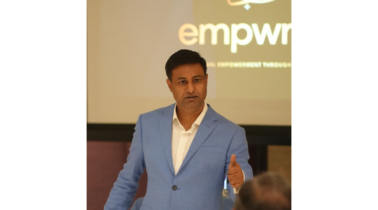Tech for good: Championing mental health through purpose-driven entrepreneurship
Jeff Lee, Founder and CEO, Zoala, Rahul Vijayan, Co-founder and CPO, Zoala & Sharmili Roy, Co-founder and CTO, Zoala.
NUS Business School EMBA Alumni, Class of 2023
Witnessing the heart-wrenching struggle of his young goddaughter’s mental health journey made Jeff Lee reflect intensely on the limitations of the existing mental health support system. This personal encounter moved Jeff to contemplate solutions.
Serendipitously, he met his like-minded co-founders, Rahul and Sharmili, with the same driving passions during our EMBA(Singapore) program. The program helped to kickstart the trio’s purposeful journey when they developed Zoala, an AI-powered mental health platform. Zoala focuses on early detection of mental health issues, personalised care, interventions, and crafting a judgement-free support community.
Today, Jeff and his team are championing mental wellness through Zoala. The mental health platform operates online and via a mobile phone app. Users receive regular check-ins, virtual assisted therapies, and community access, ensuring a seamless continuity of care. Let’s find out how the team met during the EMBA(Singapore) program and how it helped develop their synergy to start Zoala.
Q1: Jeff, your goddaughter’s experience profoundly impacted the creation of Zoala. Can you share more about how her journey shaped the core values and mission of the platform?
My goddaughter Stella’s (not her real name) tragic experience highlighted the severe limitations in the existing mental health support system for children and adolescents.
I was deeply shaken by her experience. It served as a stark reminder of the urgent need for a more comprehensive and technology-driven approach to children’s mental health support. I couldn’t stand idly by, and with that determination, Zoala was born. With our app, we wanted to ensure that no child would ever have to face the challenges she did. Thus, the mental well-being of adolescents became our utmost priority. The Zoala app now stands as a beacon for early detection of mental health issues, providing highly personalised interventions and nurturing a compassionate, judgement-free support community for those in need.
My goddaughter’s journey was a driving force behind our mission and core values. Her experience is a constant reminder of why Zoala exists and our commitment to making a positive impact in the field of mental health support.
Q2: How does Zoala harness technology to break down these barriers and create an environment where individuals feel safe seeking help?
The story of Stella profoundly influenced our product development. Stella’s experience is not unique; the number of adolescents facing well-being challenges is increasing. We aimed to address this issue at scale, identifying specific gaps inspired by her story:
- Tackling Stigma: Stella and her family hesitated to seek help due to stigma and fear of societal discrimination. Over time, her situation deteriorated. Our primary focus is to reduce this stigma and create a safe, non-judgmental space for individuals to open up and seek assistance.
- Ensuring Continuity of Care: Despite attending counselling sessions, Stella couldn’t access the care she needed when it was most crucial. We are committed to providing uninterrupted care between sessions, offering 24/7 support and assistance to bridge this gap.
- Early Detection and Prevention: A critical aspect of this narrative is the early detection of well-being challenges, allowing us to intervene at the earliest stages and escalate promptly when in dire need to prevent harm to self or others.
- Improving Accessibility to Care: Traditional counselling sessions can be a financial burden for many. Our mission is to reduce costs, make care more accessible, and empower individuals to engage in self-care practices.
Stella’s story has served as a poignant reminder of the importance of our mission, and it propels us to address these challenges comprehensively. We are dedicated to creating an environment where individuals can seek help without fear, receive continuous support, identify concerns at an early stage, and access affordable, accessible care.
Q3: Connection and continuity are significant pillars for Zoala. How does the platform foster a supportive community and ensure users never feel isolated or misunderstood?
Social connections are integral to mental well-being. At Zoala, we encourage adolescents to engage with their friends and family regularly, nurturing their social bonds and emotional well-being.
Our wellness buddy, an AI chat companion, is designed to foster connections, not engender addiction to apps or mobile devices.
It’s not a simple chat. We have thought this carefully by applying counselling and psychological aspects behind the chat to open up the person and empower within. AI promotes positive habits like checking in on “Have you had a 30-minute walk today?”, “Did you talk to your dad?” etc. Empathy is the core of our framework. AI is trained to be empathetic, validating responses to users and helping them feel heard and understood.
We have built a continuum of care by having an ecosystem around us from T1 to T4, where we partner with schools, and with the help from counselling partners who focused on the first two tiers of care and then escalated psychologist (T3) and Psychiatrist (T4) when needed.
Q4.) For Jeff, Rahul and Sharmili, how did pursuing an Executive MBA at NUS Business School shape your perspective on entrepreneurship and the role of technology in addressing real-world challenges?
The MBA program at NUS Business School was a transformative experience that equipped us with a comprehensive understanding of business fundamentals, fostering an entrepreneurial mindset crucial for devising Zoala’s business strategy. The program served as a unique networking platform, connecting us with a diverse array of professionals and experts whose insights and collaborations were instrumental in addressing complex challenges. The international focus of NUS broadened our perspective on entrepreneurship, emphasising the global impact of technology. Exposure to the latest tech trends highlighted the potential of AI in transforming mental health support, inspiring the development of Zoala as an innovative solution. Additionally, the program refined our leadership skills, preparing us to navigate and adapt through the entrepreneurial journey effectively.
In summary, our EMBA experience at NUS Business School Singapore gave us a holistic perspective on entrepreneurship and the transformative potential of technology. This perspective deeply influenced our approach to developing Zoala and our commitment to addressing real-world challenges through innovation and business.
Q5.) At what point during your EMBA program did the idea of Zoala first come to life? Can you describe the initial reactions or feedback you received from peers and mentors?
The idea of Zoala first took shape during our MBA program while we were engaged in an entrepreneurship module led by Professor Wong Poh Kam. During this course, our group of diverse classmates was exploring various business concepts, and one of the proposals that surfaced was the development of an AI-powered chatbot. While there were several compelling ideas under consideration, it didn’t take our group long to come to a unanimous decision. We recognised that addressing a mental health issue in Singapore was paramount.
As many of us were parents with children soon to be teenagers in the coming years, we recognised the significance of mental health for the future well-being of our children. Through our investigation into the existing mental health support systems in Singapore, we discovered several limitations and deficiencies in the current services, which raised major concerns about future mental health support for our children.
As our startup concept began to take shape and the name Zoala was introduced, we sought guidance and feedback from professors at NUS Business School and various mentors. Their insights and perspectives were incredibly valuable at every step of our journey. The guidance we received was instrumental in refining our concept, addressing challenges, and refining our business model.
However, our journey was far from smooth sailing. At each stage, new challenges forced us to continually reevaluate and adapt our approach, ensuring that we were creating a solution that was both effective and responsible.
Q6.) How did your respective backgrounds and skills complement each other in the development and conceptualisation of Zoala?
Our team brings together a wealth of experience and diverse skills that have proven to be the perfect blend for the development and conceptualisation of Zoala.
As a tech entrepreneur who has successfully started and exited businesses, Jeff provides invaluable insights into startups, product development, and business strategy. His experience navigating the complexities of entrepreneurship and the ability to see the big picture has played a crucial role in steering Zoala’s strategic direction.
Rahul’s two decades of experience in the software and open-source industry bring a deep understanding of technology, software development, and the technical landscape. His expertise in software engineering and open-source solutions has been instrumental in building the technological backbone of Zoala, ensuring that the chatbot is innovative, robust and reliable.
Sharmili’s PhD in AI is a key asset in Zoala’s conceptualisation. Her academic knowledge and expertise in artificial intelligence have allowed us to harness the full potential of AI to create a chatbot that is not only technically advanced but also ethically responsible. Sharmili’s insights into AI ethics and her ability to guide the development process with a focus on responsible AI have been invaluable.
Collectively, our team has over 60 years of tech experience and strong business acumen. This diverse expertise ensures we have the right blend of entrepreneurial spirit, technical proficiency, and AI ethics knowledge to conceptualise, develop, and operate Zoala effectively.
Q8.)What were some of the most significant challenges you and your team faced while developing Zoala at the NUS Business School, and how did you overcome them?
Developing Zoala at NUS Business School posed significant challenges that required strategic solutions:
- Data Protection: Safeguarding sensitive data, especially for minors, was a primary concern. We implemented strict security measures, data anonymisation, and legal consultations to ensure compliance with local PDPA regulatory requirements.
- Ethical Implementation of AI: Integrating AI into a human-centric service raised ethical questions. To overcome this, we established a clear ethical code, emphasising transparency, accountability, and regular ethical reviews in every solution design.
- Mental Health Stigma: Overcoming the stigma surrounding mental health and gaining parental support was critical. We initiated surveys with some awareness campaigns and engaged mental health professionals whom we know and could get advice on reducing stigma and building trust and acceptance.
We proactively addressed these issues with NUS professors and any subject matter experts recommended by professors and the NUS alumni network.
Q9.) How instrumental was the environment at NUS Business School in providing the resources, mentorship, and support required to turn the concept of Zoala into a reality?
Meticulously structuring every facet of our operations around essential frameworks, we optimise value through the VPC framework. To foster emotional connections, we sought to understand our users via design thinking principles and conduct informed market research and strategic decision-making using tools like PESTEL and Porter’s Five Forces. The foundations of these invaluable frameworks, which guide our structured thinking and mitigate risks in our decision-making processes, can be traced back to the comprehensive education provided by our EMBA program.
Amongst these invaluable insights, one that stands out, as aptly mentioned above, is the concept of ‘purpose.’ We owe our deep understanding of this to Dr. Prem’s class. It centers around profound questions: ‘What do we stand for?’ ‘Why do we exist?’ ‘What larger cause do we champion?’ Our purpose is clear: we are a purpose-driven company committed to providing universal mental health access, empowering children from the early phases of life, and creating a positive societal impact, all while achieving our financial objectives.
Q10.) Given Zoala’s roots and commitment to improving mental wellness, what future innovations or expansions can users and supporters anticipate? How do you envision Zoala evolving to address the ever-changing mental health landscape?
At the core of our vision lies a relentless commitment to prioritise Mental Wellness. Our unwavering mission is to empower adolescents with the essential tools that propel them from merely being ‘good’ to truly thriving. Instead of simply rolling out new features, we constantly dialogue with our users to understand how to further assist them in realising their maximum potential. Here are a few key areas we are actively exploring.
Zoala aims to provide comprehensive crisis support, ensuring immediate assistance through connections to crisis hotlines and AI-powered intervention services. The platform is also set to introduce innovative self-care tools, such as journaling, smart goal setting, and engaging wellness activities. Additionally, Zoala focuses on fostering a supportive community by connecting users with peer support leaders and creating moderated forums for shared experiences. Lastly, we are dedicated to expanding accessibility by potentially including localised content, language support, and features tailored to diverse users.


